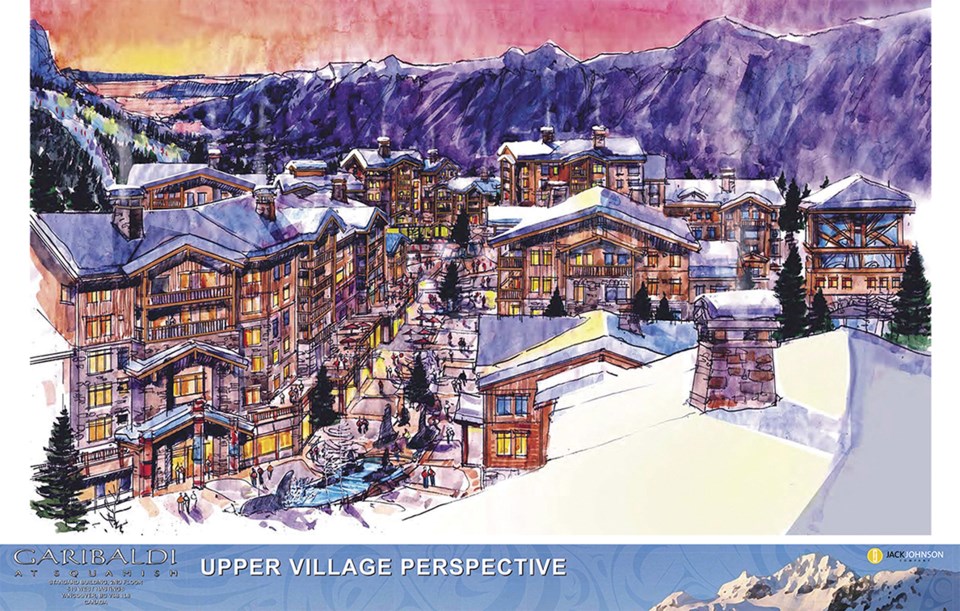Will Squamish welcome an all-season resort for 22,000 people?
That‘s the question that the Garibaldi at Squamish proponents asked about 200 people who attended an open house held last Thursday.
People mingled about display boards detailing the $3.5 billion project, then listened to a presentation about the benefits of what is expected to be an environmentally friendly resort where people park their cars and travel around by electric train.
Garibaldi at Squamish would create about 2,500 full-time equivalent jobs at the resort, 15 kilometres north of Squamish, according to the proponents. The principals are Northland Properties and Aquilini Investment Group, which developed Revelstoke.
CEO David Negrin emphasized the project is not only a ski resort, rather a year-round resort that will include three villages, ski slopes, restaurants and hiking and mountain biking trails that people can use for free. Garibaldi is also popular for snowmobilers and ATV riders.
During a question and answer session, Squamish resident Robert Forsyth pointed out the trails were “always free,” and many in the crowd clapped.
Several members of Squamish Nation stood up and expressed concerns about the project on their ancestral lands, including “major displacement of wildlife,” effects on salmon spawning, lack of sufficient water and sewage treatment.
One member said Squamish Nation has stopped the project three times before, adding “there’s just no water.”
“Squamish belongs to my ancestry, my people,” said an elder. “I’m here to protect our traditional territory, my ancestors’ territory.”
“I clearly understand there’s a lot more work to do with you,” said Negrin.
A resident of Paradise Valley told the crowd that Aquilini is now starting to listen to residents of the area and making an effort to address concerns.
Former Squamish mayor Corinne Lonsdale said while the Garibaldi at Squamish project was proposed about 25 years ago, things have changed since Aquilini got involved. “I believe it is now supportable,” Lonsdale said. “The project will have a positive impact on the community.”
She noted it would create long-term jobs here, contribute to the tax base and derive income from the tourists, many of whom use Squamish as only a day trip.
Garibaldi at Squamish would create real, permanent jobs so residents wouldn’t have to travel to Vancouver, Negrin noted.
He added the company would build housing starting at $169,000, much less than in Whistler, and also plan to build affordable housing in Squamish itself “for people with a $40,000 income.”
If the district annexes Garibaldi, taxes will go down, said Justin Page of Environmental Resource Management.
“A three per cent decrease in property taxes for Squamish residents is predicted for Squamish residents if the project is successful,” said Page.
In Whistler, 45 kilometres north, people are worried about the project.
“We have grave concerns,” Whistler-Blackcomb Holdings Inc. president and CEO Dave Brownlie told The Squamish Chief at the open house. “It doesn’t make sense…. I can’t believe something would get this far and they have no data on snow.”
He said if the resort is built and there is insufficient snow for skiing, “I think it’s bad for skiing in B.C.”
Brownlie pointed out Garibaldi at Squamish wasn’t contemplated in the regional growth strategy and lacks support from local governments.
“If it was a great resort, I would be knocking down doors to get involved… It’s a big real estate play. It doesn’t have the makeup to be a world-class ski resort.”
But Negrin emphasized to the crowd later that Garibaldi would be “a four-season resort.”
“This is not just a ski resort. This is an all-mountain ski resort… in one of the most beautiful scenic areas I have been in.”
“Even though there’s more than a whisper of climate change, we can make snow now,” added master planner Jack Johnson, who designed major ski resorts in Utah. “We can make artificial snow much thicker than we used to.”
“At the end of the day, it will be the people of Squamish, Squamish Nation and Squamish council to make the decision,” said Negrin.



